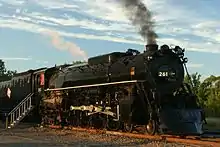| Milwaukee Road S3 class | |||||||||||||||||||||||||||||||||||||||||||||||||||||||
|---|---|---|---|---|---|---|---|---|---|---|---|---|---|---|---|---|---|---|---|---|---|---|---|---|---|---|---|---|---|---|---|---|---|---|---|---|---|---|---|---|---|---|---|---|---|---|---|---|---|---|---|---|---|---|---|
_'Old_Smokey'_on_display%252C_Milwaukee%252C_WI_on_January_29%252C_1966_(22432765472).jpg.webp) MILW 265 on display in Milwaukee, Wisconsin in early 1966. | |||||||||||||||||||||||||||||||||||||||||||||||||||||||
| |||||||||||||||||||||||||||||||||||||||||||||||||||||||
| |||||||||||||||||||||||||||||||||||||||||||||||||||||||
| |||||||||||||||||||||||||||||||||||||||||||||||||||||||
| |||||||||||||||||||||||||||||||||||||||||||||||||||||||
The Milwaukee Road S3 Class was a class of 10 4-8-4 "Northern" type steam locomotives built by the American Locomotive Company in 1944 and operated by the Milwaukee Road until the mid 1950s. The locomotives saw service in pulling freight and passenger trains throughout the Milwaukee Road.
Today, two S3s survive, No. 261 is in operating condition and No. 265 is on display in Union, Illinois.
History
The Milwaukee Road had acquired its first four-unit EMD FT diesel set in October 1941. It had managed to get a second in July 1943, but when it wanted more in 1944, it was only allocated six by the War Production Board. Instead, it was allocated ten Alco 4-8-4 locomotives. These were delivered in July and September 1944, and were classified as class S3 by the Milwaukee Road.[1]
Design
Alco had drafted a compromise design, as the WPB has placed a moratorium on creating completely new designs. It was based on the frame of the Chicago, Rock Island and Pacific Railroad class R67B, mated to the boiler of the Delaware and Hudson Railway class K. The tender was a water-bottom type with a pair of six-wheel trucks.[2] They were also fitted with an air horn.
The 96.20 square feet (8.937 m2) of coal-burning grate supplied heat the boiler which was pressed to 250 pounds per square inch (1.72 MPa). This supplied steam to the cylinders which had a bore of 26 inches (660 mm) and a stroke of 32 inches (813 mm). They were connected to the 74 inches (1,879.600 mm) diameter driving wheels by Walschaerts valve gear.
While they were smaller and less powerful than the Milwaukee's earlier class S2, they were comparable to road's first class of 4-8-4, the class S1 and were equipped with roller bearings.
Construction
All ten were built by Alco's Schenectady plant in July (7) and September 1944 (3). Alco assigned order number S-1928 and serial numbers 71973 through 71982.
Service
Initially they were used as freight locomotives, and only used on lines east of the electrified zone, being allocated to the Dubuque and Illinois Division (now the Canadian Pacific Kansas City Elgin Subdivision). As a consequence of the Korean War, additional locomotives were needed on the Idaho Division, so four locomotives (262, 263, 267 and 269) were converted to oil firing and sent west to work passenger and freight trains in the gap between the two electrified zones.[1]
By March 1954, No. 260 had been transferred to the La Crosse and River Division, and 261 was on the Milwaukee Division; the other four coal-burners were still on the D&I Division, and the four oil-burners on the Idaho Division.[3]
By December 1954, however, the Milwaukee was effectively dieselised. As the equipment trusts on the ten locomotives had yet to expire, they could not be scrapped or sold, so they were placed into storage – the Idaho four going to Tacoma.[4]
| No. | Alco serial number | Built | Retired | Notes |
|---|---|---|---|---|
| 260 | 71973 | July 1944 | December 1954 | |
| 261 | 71974 | July 1944 | August 1956 | Preserved |
| 262 | 71975 | July 1944 | December 1954 | Converted to burn oil |
| 263 | 71976 | July 1944 | December 1954 | Converted to burn oil |
| 264 | 71977 | July 1944 | February 1956 | |
| 265 | 71978 | July 1944 | September 1956 | Preserved |
| 266 | 71979 | July 1944 | February 1956 | |
| 267 | 71980 | September 1944 | December 1954 | Converted to burn oil |
| 268 | 71981 | September 1944 | December 1954 | |
| 269 | 71982 | September 1944 | December 1954 | Converted to burn oil |
Preservation

Two S3s survived into preservation:
- Milwaukee Road 261 was retired in August 1956 and donated to the National Railroad Museum in Green Bay, Wisconsin in 1958. Today, the locomotive is owned, operated, and maintained by Minneapolis-based nonprofit organization Friends of the 261, which runs occasional and seasonal excursion trains using the locomotive.
- Milwaukee Road 265 was retired in September 1956 and donated to the city of Milwaukee, Wisconsin and sat the on display until 1975. The locomotive was then moved to the Illinois Railway Museum in Union, Illinois where it currently resides.
References
- 1 2 Holley (1987), p. 196.
- ↑ Drury 1993, pp. 117, 126, 145–146.
- ↑ Stauss (2001), pp. 14–15.
- ↑ Holley (1987), p. 197.
- ↑ Edson (1977), p. 106.
- Barrie, Wes. "Milwaukee Road 4-8-4 "Northern" Locomotives in the USA". steamlocomotive.com. Retrieved 2020-08-29.
- Drury, George H. (1993), Guide to North American Steam Locomotives, Waukesha, Wisconsin: Kalmbach Publishing Company, ISBN 0-89024-206-2, LCCN 93041472
- Edson, William D. (Spring 1977). "Milwaukee Road Locomotives". Railroad History. Boston, Mass.: Railway and Locomotive Historical Society. 136 (136): 106. JSTOR 43523968.
- Holley, Noel T. (1987). The Milwaukee Electrics (1st ed.). Hicksville, New York: N. J. International Inc. pp. 196–197. ISBN 0-934088-14-4.
- Stauss, William F (2001). The Milwaukee Road in Color Volume 4: Iowa, Missouri, Minnesota and the Dakotas. Scotch Plains, New Jersey: Morning Sun. ISBN 1-58248-058-3.